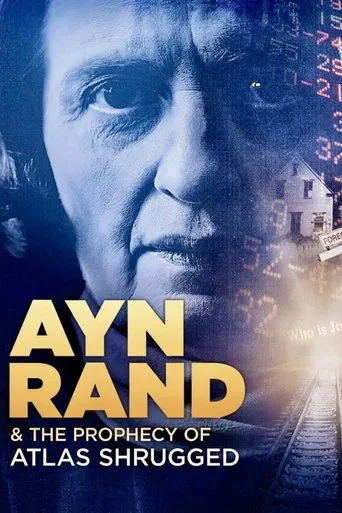

Sadly Over-hyped
... View MorePlot so thin, it passes unnoticed.
... View MoreIt's the kind of movie you'll want to see a second time with someone who hasn't seen it yet, to remember what it was like to watch it for the first time.
... View MoreAmazing worth wacthing. So good. Biased but well made with many good points.
... View MoreThe documentary is a good summary of "Atlas Shrugged," and the ethics and politics that inform it. It also has some biographical information about Rand up to the book's publication. It would be a good introduction for people new to the book and her ideas. I started reading Rand about 30 years ago and I wish the documentary would have gone deeper. I would have preferred 30 minutes less of cheerleading and 30 minutes more of exploring her ideas and their ramifications.That the documentary didn't go into Rand's personal life and the Objectivist movement's ups and downs was a mixed blessing. I was surprised that Leonard Peikoff wasn't in the documentary but Amy Peikoff was, and that it completely ignored 9/11 and what I consider Objectivism's hysterical response to Islamic terrorism, which continues to this day.
... View MoreThis movie became an inspiring and enjoyable introduction into Ayn Rand's life. I did not read the originals and I was looking for a good summary, since I am mostly interested in her philosophical views (not the fiction aspects of the book). Now I am happy to have invested 83 minutes into the movie, which turned out to be a wonderful summary with a snappy summary of her life all the key quotes from her magnum opus. The movie contains interviews with herself, as well as sharp observations from researchers and students, such as "she was a bomb-thrower" or "America has to live through Atlas Shrugged now".I guess, the phrase "Any work is creative work if done by a thinking mind" applies to this movie - it was definitely done by a thinking mind, and made me think.
... View MoreThis film is a must-see for any Rand fan and/or anyone who's ever been affected by her novels. Also recommended for anyone who has not read Rand but wondered what all the fuss was about. In an age where your 'best sellers' are selling 50,000 books, Atlas Shrugged - over half a century old - has been selling nearly ten times that number. Three million sold in last five years alone. This documentary does a good job of explaining why. It includes the genesis of the ideas that permeate Rand's novels and her struggle to complete Atlas. Also shows how the scenario of Atlas is being played out in America today. Highly recommended.
... View MoreThis documentary does a good job of capturing Rand's ideas and philosophy - missing in the movie that came out last year. It starts out with the idea that the events of the novel are being played out in real life today. Then it drops back in history to show how Ayn Rand escaped from communist Russia and came to America in the 1920's. But when she finally got here and the Depression started, how surprised she was to hear American intellectuals claiming that things were so much better in Russia with communism being the answer for everything. But Rand knew differently. She knew that the 1930's under Stalin saw tens of millions murdered or starving and forced to work in labor camps. Rand spent her career making it crystal clear - especially in Atlas Shrugged - that collectivism in any form is inherently evil and inevitably leads to disaster.The documentary also focuses on Rand's contention that the so-called virtues of altruism and self-sacrifice are misguided and that this willingness - so ingrained now in progressive western thinking - to subjugate the individual to the collective is not only most responsible for our country's current woes but it is this same twisted sense of morality that ultimately leads to totalitarianism.This is a film with a lot of information and insight that can easily be viewed more than once.
... View More